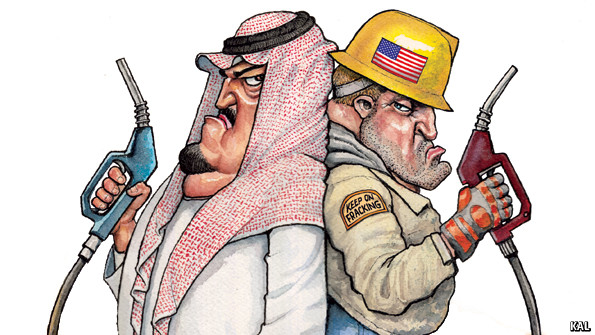Can the U.S. Become an Energy Superpower in 2017?

While OPEC—and in particular Saudi Arabia—bites the bullet and concedes to these oil production cuts, producers around the world stand to benefit from a bump in prices. Here in the U.S., this should mean a corresponding rise in output as more shale plays become profitable. That would work to offset the clamp on global supply OPEC is trying to accomplish, and therefore blunt the effect of this cut while simultaneously helping American producers gain a greater share of the global market. This is why Riyadh has been so loathe to agree to a cut. The extent to which U.S. shale firms are able to capitalize on rising prices will determine how successful this reluctant change in the petro-states’ tactics will be. --The American Interest, 30 November 2016
So far it has cost Saudi Arabia something like $200 billion to undertake one of the most expensive experiments of all time. The Saudi government has been draining its massive $2 trillion sovereign wealth fund to cover revenues lost from the petroleum price collapse over the past couple of years. What we’re witnessing is a two-part test. The first question is how much damage low oil prices will have caused America’s shale industry. Then the second and far more critical part of the test: as oil prices rise, will the shale industry limp or roar back? If it roars back, high oil prices are history. Odds are now that in 2017 we will witness — along with the oil princes of Arabia — the outcome. However it goes, the economic and geopolitical implications are enormous. And the outcome has more to do with technology than with politics. --Mark P Mills, Forbes, 30 November 2016
For decades, America depended on the world for energy. Today, it’s becoming a global supplier of oil and natural gas in its own right. This year, for the first time ever, the U.S. started turning gas from prolific shale formations into liquefied natural gas (LNG) and sending it overseas. In 2017, the country may be exporting more of the heating fuel than it imports for the first year since the 1950s. The shale revolution has undoubtedly put America on a path to becoming a global gas powerhouse. The ability to find more buyers as U.S. capacity increases at a competitive price will dictate how dominant the U.S. will become as an energy power in 2017 and beyond. --Dave Merrill and Christine Buurma, Bloomberg, 30 November 2016
America’s uncertain stance toward global warming under the coming administration of Donald J. Trump has given China a leading role (sic!) in the fight against climate change. But there is a problem: Even as it does so, China is scrambling to mine and burn more coal. A lack of stockpiles and worries about electricity blackouts are spurring Chinese officials to reverse curbs that once helped reduce coal production. Mines are reopening. Miners are being lured back with fatter paychecks. “I get a kick out of people in the West who think China is decarbonizing, because I see no sign of it whatsoever,” said Brock Silvers, a Shanghai banker who has previously served on the boards of two Chinese coal companies. --Keith Bradshernov, The New York Times, 29 November 2016
The global battle against climate change has passed a historic turning point with China’s huge coal burning finally having peaked, according to senior economists. China is the world’s biggest polluter and more than tripled its coal burning from 2000 to 2013, emitting billions of tonnes of climate-warming carbon dioxide. But its coal consumption peaked in 2014, much earlier than expected, and then began falling. “I think it is a real turning point,” said Lord Nicholas Stern, an eminent climate economist at the London School of Economics, who wrote the analysis with colleagues from Tsinghua University in Beijing. “I think historians really will see [the coal peak of] 2014 as a very important event in the history of the climate and economy of the world.” --Damian Carrington, The Guardian 25 July 2016
In the run-up to next year’s general elections, Germany’s Christian Democrats (CDU) are considering a rapid end to subsides for renewable energies. Wind, solar and biogas plants would in future have to financially “stand on their own feet,” according to a draft discussion paper by the Federal Committee for Finance, Economy and Energy, seen by the German magazine Der SPIEGEL. --Stefan Schultz, Der Spiegel, 29 November 2016
Renewable energy should no longer have top priority in Europe’s electricity grid, the E.U. energy commissioner told Handelsblatt in an exclusive interview. Miguel Arias Canete said renewable energy should have the right of way over other forms of energy only when the electricity grid is maxed out. “But when it comes to simply feeding in electricity under normal market conditions, energy from already existing plants and small projects, such as solar panels and private homes, should have priority,” Mr. Canete said. E.U. member states should also be allowed to build energy reserves from coal and gas plants under certain conditions, Mr. Canete said. --Handelsblatt Global, 30 November 2016
Not a single political party in the Netherlands managed to go far enough in their election promises on the environment to reach the climate target set in the Paris Agreement, the Volkskrant reports based on its own analysis of the election campaigns of the Dutch parties. Even where programs embrace the Paris targets, their intentions fall short, according to the newspaper. --Janene Pieters, NL Times, 29 November 2016
No comments:
Post a Comment